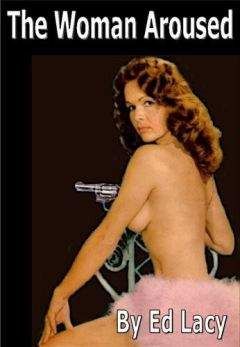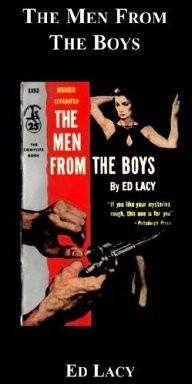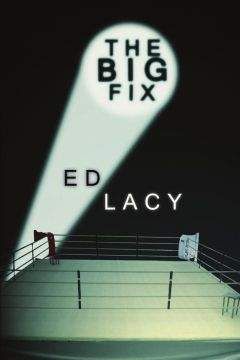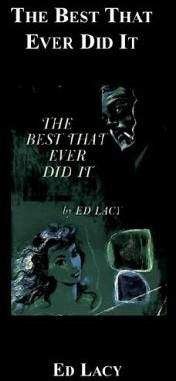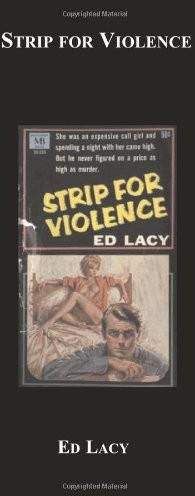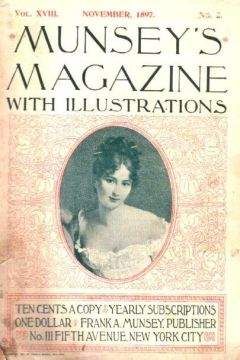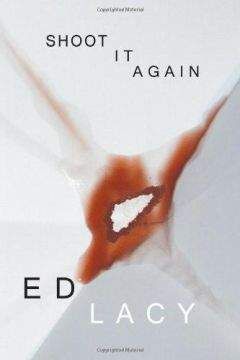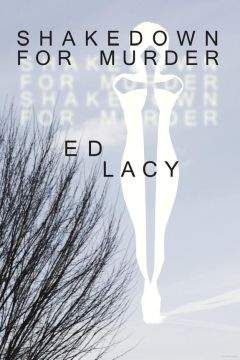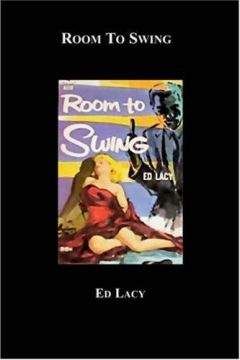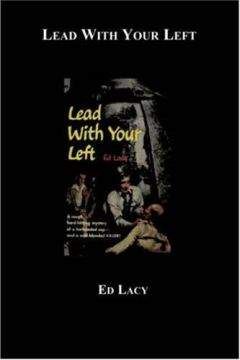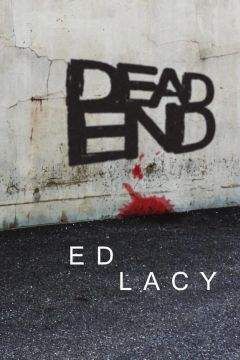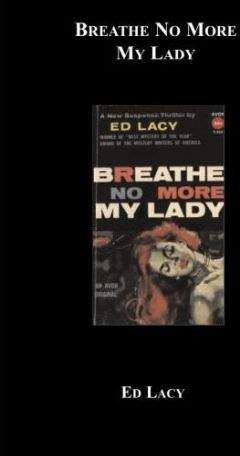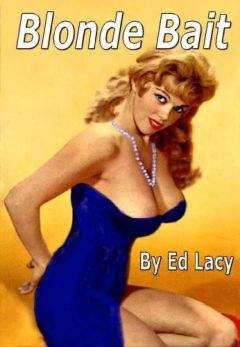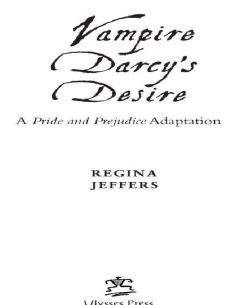Ed Lacy - Enter Without Desire
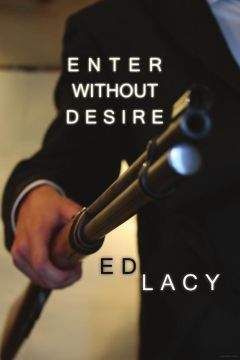
Скачивание начинается... Если скачивание не началось автоматически, пожалуйста нажмите на эту ссылку.
Жалоба
Напишите нам, и мы в срочном порядке примем меры.
Описание книги "Enter Without Desire"
Описание и краткое содержание "Enter Without Desire" читать бесплатно онлайн.
He smacked me across the face. He was eighteen. I had just turned thirteen, stunted, but already muscular and with big shoulders from shoveling manure in the fertilizing plant every day after school.
We were having a hell of a fight when my old man came out, cursed us. “This a time to fight? Stop it or I'll break both your necks.”
I looked at his thin body—even winter underwear hung on him—and I thought I could break his neck with no trouble if it ever came down to neck-breaking. He was under forty, should have been at his peak, but he'd put in over twenty-five years in the mill.
I had childish ideas about age then. Mom was thirty-three, a faded, skinny woman with sparse hair a mixture of sandy-blonde (like mine) and gray. To me she was an old woman. But one afternoon I was doing an errand and saw this big car draw up and this beautiful woman get out. She was something, all straight and slim, lovely red hair, and of course well dressed. Some kid said, “Know who that doll is, wife of one of the mill owners. The fat guy.”
The “fat guy” was a big man, over six feet tall, and almost as wide around the belly. But an old man. I stared at this pretty girl, asked, “What'd he do, rob the cradle? She isn't over eighteen.”
“Listen to you—eighteen! Don't be dumb, she's going on thirty-seven.”
“Thirty-seven—you're balmy.”
“I know. I was working at the newspaper last month when she had herself a fancy birthday party, and there was talk about giving her age or not.”
And Mom was younger than her and looked like the girl's mother!
See, not knowing any better, I didn't mind the shack we lived in, the row on row of company shacks in the company street, the company store. Despite the poverty around us, we kids had fun. But now I realized what the mill did to you, what it had taken out of Mom. I made up my mind to escape before I started looking as old as Pop.
Mom and Pop are still down there, still working—taking it. Never even think of asking out. They're caught too firmly.
I was the first kid in our family to graduate public school. My older brothers were against any more school, but I was too small and young-looking to work in the mill. It was agreed I might try one term in high school. Although small, I was the strongest kid in town, and when the gym teacher saw me in shorts, he told me to try out for the football team.
There was only one subject of conversation on the football squad—one common prayer—each one hoped a scout would see them, give them an athletic scholarship to a college... where a pro scout might see them. Football didn't mean a thing to me till then. A scholarship would be my passport out of town, from the mill... when that idea bedded down between my ears I decided I'd become the best football player in school.
I lived and slept football. Because of my size I had to rely on speed, so I began to run. I'd run everywhere I went. Soon I had speed and because of my overlarge shoulders I could give a guy a hell of a jolt when I tackled him. I got bounced around plenty myself, but I was light on my feet, and in high school there wasn't too much difference in weight.
Our school was very small. Mill people made up the bulk of the town, but very few mill kids went to high school. Our coach was an ambitious ex-college player named Buster Lucas. He coached all the teams from football to tennis, taught gym, too. His ambition was a break for me. Also he was a second cousin to the owner of the biggest restaurant in town.
Working after school, playing football, was killing me. Mom said something about giving up this “football foolishness.” I went to Buster, told him, “Coach, I can't keep up three things at once; working, playing ball, and going to school. I was thinking of your cousin. For the sake of the school, he might give me an after-school job. Something not too tiring and paying ten a week.”
“Doubt if he'd go for that,” Buster said, studying me.
It was just before practice and I began to take off my football togs—slowly. “My folks need the dough, so I can't give up shoveling fertilizer. Can't keep burning myself out, either, so....”
“This is a hell of a time to talk like that—middle of our season.”
“Your season. Hear your cousin is a big sport, always betting on the team. Now he must make more than ten bucks a week on bets alone.”
“Okay, I'll talk to him,” Buster told me.
The job was ideal. Each evening, from six to nine, and half a day Sunday, I slipped on a white jacket, kept the water glasses on the tables filled. I picked up a few cents in tips. Best of all, I ate like a pig in the kitchen, stuffed myself with good food, plenty of meat.
By the time I was seventeen, I was still a runt but weighed 165 pounds, had walking beam shoulders that made me look even shorter than I was, and legs like tree trunks. There were write-ups in the paper about me, about the team winning the state title—which really didn't mean much in Kentucky. But it all helped the tips I pulled down in the restaurant.
In my senior year, Buster got a Dayton high-school job. I had scholarship feelers from two big southern schools, and a half dozen small, Midwestern colleges. When the team went up to Cincinnati, across the Ohio River, for a radio interview, I hitched my way on up to Dayton, told Buster about the offers.
He said, 'Marsh, you're too small to ever be a real football player. You got to have beef in this game. I was you, I'd forget college ball.”
“I didn't come to ask you that. Football has kept me out of the mill, now it will put me on a college gravy train, get me the hell out of that hick burg.”
Buster shrugged. “You've always been a cocky little bastard. Okay, but watch out you don't get hurt. College ball will be a lot different. Tell you, Marsh, take a small college. Grind won't be so rugged there.
It was a little school in Indiana that was out to build a stadium, make money. I got fifty bucks a month plus room and board for emptying the gym trash basket—often it would need emptying every month. I made another fifty waiting on table. I liked college. I not only had the prestige of being a “football man,” but more important I found out all the sketching I'd done as a kid wasn't outright junk. I decided to study advertising art, which was supposed to be a big money deal.
Buster was right about football—I was playing against bruisers averaging 210 pounds and I still couldn't tip the scales above 166. I was light and fast on my feet, still bounced around like a ball—only sometimes after a game I had to stay in bed all day. After the freshman year, I got the regular sub berth at left end. During the summer I wangled a scholarship at the Chicago Art Institute, and a job at a children's day camp that kept me in food.
I was finishing my soph year when they pulled the props from under me. We were playing a big university—a game we couldn't possibly win—but the university had a large stadium and “our” cut of the gate was big dough. They put me in the second quarter and I picked up yardage in two plays. We had one of these hidden ball deals where I ran to the right sideline, made like a bunny down the field, and cut in to receive the pigskin. Our back could rifle the ball like a bullet. As I cut in, I put my hands up in the air and the ball was there—as I knew it would be. Tucking the leather under my arm, I started making tracks. I was twenty yards from their goal and only a safety man ahead of me.
A week later, when I was still in the hospital, the coach showed me movies of the game. A brace of giants who ran like they were jet propelled got me from the rear. Some 437 pounds of brawn gave me a brain concussion, along with minor bruises.
I snapped out of the concussion without being paralyzed, but the docs warned me to be careful—mustn't fall or trip, watch myself going downstairs—“a misstep can give you an awful jar.” Any sudden fall, I could end up blind, or dead. They gave me a long lecture about staying out of fights and football games for the next few years—a clout on the jaw could leave me bedridden, if it didn't kill me. I finished out the term and in a way I was even a sort of campus hero... but of course my athletic scholarship wasn't renewed.
I hit New York with some good clothes, not many, but what I had was, and looked, expensive, and a little over a hundred bucks in my kick. I was twenty and confident I'd set the advertising world on its bottom. I got a cheap room on the outskirts of the village, practiced hard to get rid of my drawl, and anything that would make me sound like a hick. To be a “hick” seemed to my childish mind to be the greatest of horrors, and calling me a “hill-billy” was fighting words.
I was in love with New York. Broadway fascinated me, Fifth Avenue amazed me, Central Park was lovely country, and Coney Island the place for a mad night. I liked watching the smartly dressed women on the streets, the shops; the tension of many people in the air. I even enjoyed the constant rush, the great wasted energy of a city.
The phony, fairy atmosphere of the Village interested me, with the would-be “Bohemian” bars, the comic jokers who roamed the streets trying overhard to be characters. It was 1939 and I soon realized the Greenwich Village I'd read so much about had vanished a dozen years before.
Dressing my sharpest, I began making the rounds of the agencies with my sketches, then rushing back to my room to hang up my good shirt and change to an old one. But the ad business was glutted with eager kids like myself. Although I lived as cheaply as I could, my money didn't last three weeks. I found a job as a waiter in a large coffee pot, and on my off days still made the rounds of the agencies, getting a little punchy from the polite doors slammed in my face.
I hit this small agency one afternoon, one of these compact outfits with a few good accounts. The boss was a shorty like me, but gone soft and fat. His name was Barrett. His assistant was Marion Kimball and she was in the process of giving me the brush-off, the usual line about ”... although your work shows definite talent, at the moment we do not have any openings...” when she suddenly reached across the desk and felt of my arms. It was a muggy day and I only had on a thin sport shirt. Due to not eating regularly I was in fair shape. She said, “My God, real midget muscle man, aren't you? Stick around for a second.”
She called Barrett on the office phone. He came in and looked me over like he was a queer. Turning to Kimball he grunted, “He's the man.” Then he favored me with a grunt. “Thirty a week. Okay, son?”
“Yes, sir!” I said, my heart pounding. Thirty was low, even for a starter, but that didn't matter... I actually had a job as an artist!
“Miss Kimball will explain your duties,” Barrett said and left us.
Marion Kimball looked like she could be in her late twenties, middle thirties, or even older. She had a firm, hard figure, probably well girdled, and a shrewd and sophisticated face under a smart makeup job, and she was expensively and smartly dressed. A handsome woman, rather than pretty. She grinned and it was her teeth that told me she was older than she appeared. “Let me break this to you right, Jameson. I'll let you do some art work, whenever I can. But you're a rent collector.”
“A what?”
“My, my, aren't we shocked and angry.”
“Well damnit, I'm an artist and...”
“Get the wind back in your sails, Jameson. Take the job, artists are a nickel a dozen. Job is fairly easy. Barrett owns several houses, some of them tenements. He has a complex about being held up, and a mania about real estate agents screwing him. Also, he hasn't the time to look after the houses. You'll do that, and collect the rents. Be any trouble bonding you?”
“I don't think so.”
“Fine. The houses won't take up all your time, and I will try to give you some art work. Buying it?”
“Yeah,” I said, disappointed as the devil.
We shook hands. Kimball's hand hard and warm, almost intimate.
It wasn't a bad job. I had seven houses to “take care of.” Each day I'd leave my room at about ten, start making the rounds of the houses. There were two “good” houses on West 55th Street, former brownstones that had been converted into small, expensive apartments. There were large tenements on the lower West Side, where five rooms and hot water rented for $30, and one house in Harlem where five rooms without heat or hot water rented for $40.
At each house I'd chat with the janitor, pick up what rents he had, visit people who were behind and maybe send them to the relief office. I had the authority to okay small repairs, or even order a paint job. Around the first of the month I'd be busy, put in full days, but usually I was finished by one, would drop into the office and give Barrett a quick accounting—and the dough—then finish out the day behind my drawing board.
I soon wised up to some of the soft dough waiting to be picked up. It was real small time, but I could average an extra ten bucks a week. Barrett probably knew about these rackets, that's why he started me at thirty. For instance, I'd tell a janitor to buy a broom and pay him when he gave me the paid receipt from the hardware store... then I'd add a new pail or a couple of pounds, of soap powder on the receipt—pocket the buck or two.
As I said, it was petty scuffling.
When there was an apartment to be painted, I had a choice of several painters and by dropping a hint that I was interested in a Broadway show, I'd chisel a pair of orchestra seats now and then.
There were other angles that could be worked with the janitors. If a tenant moved in on the fifteenth of the month, I'd hold his rent till the first of the following month, tell Barrett he'd moved in as of the first. Then when he paid again on the fifteenth, I'd split this one “extra” rent with the janitor. As long as I remembered to make out the tenant's receipt dated the fifteenth, everything was okay. Sometimes, when I had a couple hundred bucks in rent money on me, I could even short-change Barrett out of a five spot.
If you think this was a petty hustle, remember the janitors had their own angles. But it wasn't hard work, my hours were my own, and I never got tough with anybody or looked for trouble.
Подписывайтесь на наши страницы в социальных сетях.
Будьте в курсе последних книжных новинок, комментируйте, обсуждайте. Мы ждём Вас!
Похожие книги на "Enter Without Desire"
Книги похожие на "Enter Without Desire" читать онлайн или скачать бесплатно полные версии.
Мы рекомендуем Вам зарегистрироваться либо войти на сайт под своим именем.
Отзывы о "Ed Lacy - Enter Without Desire"
Отзывы читателей о книге "Enter Without Desire", комментарии и мнения людей о произведении.





